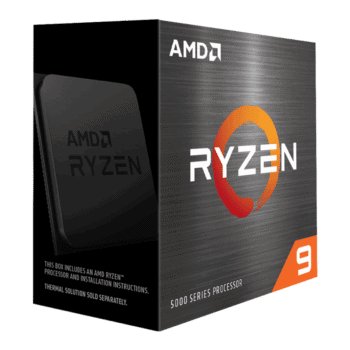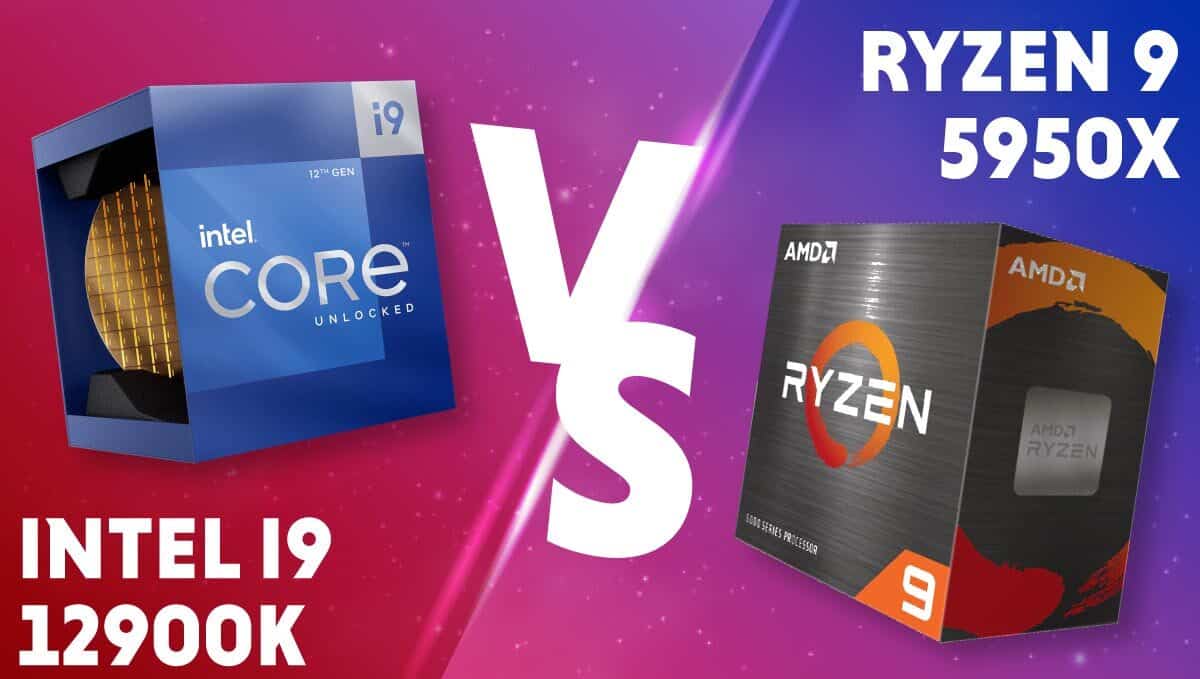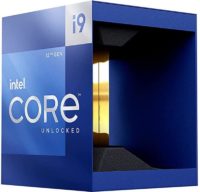AMD Ryzen 9 5950X

Very high single-core performance
Great for gaming and workstation tasks
Excellent overclocking potential
High price tag
Requires CPU cooler
Shop on Amazon
CHECK PRICEWe take a look at the specifications, benchmarks, price, and performance of both CPUs and determine which one is a better buy.

WePC is reader-supported. When you buy through links on our site, we may earn an affiliate commission. Prices subject to change. Learn more
When it comes to the 12900K vs 5950X, which is better? The battle of AMD Vs Intel has been a long one, with Intel dominating the CPU market in terms of performance for many years. That is until AMD announced its new Ryzen CPUs back in 2017, which have been improving exponentially with every new version, and closing the gap on Intel with each generation. We hope you find what you need in this Core i9 12900K vs Ryzen 9 5650X article.
The latest comparison is the 12900K vs the 5950X, the top of each company’s food chain.
The 12900K does have a massive technological advantage over the 5950X, but will the 5950X’s raw power be enough to pull through?

Very high single-core performance
Great for gaming and workstation tasks
Excellent overclocking potential
High price tag
Requires CPU cooler
Shop on Amazon
CHECK PRICE
Powerful single core performance
Powerful multi-core performance
Overclockable
Expensive
Shop on Amazon
CHECK PRICEHere we will examine both the 12900KS and the 5950X’s specifications, to see how they stack up against each other. Examples of specifications are core speed, cache size, and thread count.
The i9 12900K was the old Intel flagship before the 12900KS was released, and with its incredible single-core performance it owned the top spot in the CPU market for well over a year. But how will it stack up against AMD’s current flagship, the 5950X?
The specifications of the 12900K are as follows:
The AMD Ryzen 9 5950X is a monster in its own right, and this goliath is AMD’s best CPU currently on the market. Since its release on November 5, 2020, it’s dominated the competition, breaking records in terms of power and multi-core performance.
The specifications of the Ryzen 9 5950X are as follows:
Here we will compare the specifications of each CPU and determine which one is better for specific workloads. This should help you make an informed decision when comparing any two types of components in the future.
Cores and threads were not built the same but work in very similar ways. Let’s take a closer look at what cores and threads are, and the differences between them.

Both of our CPUs have the same number of cores theoretically, but eight of the 5950X’s cores are far more powerful.
Core count is an important attribute to consider in any processor, as a CPU with a higher core count will be more efficient at multitasking. More processes can be handled by the CPU simultaneously and this will reduce instruction queuing slowdowns. However, it all depends on whether the program or app you’re using supports multicore workloads. Most do in this day and age, but not all of them.

The Ryzen 9 5950X has a higher thread count at 32 threads.
Thread count can be thought of much like core count – the more threads you have, the better at multitasking your CPU will be. However, cores and threads are not the same.
SMT is the technology AMD implements into its Ryzen processors, in Intel CPUs it’s called Hyperthreading, enabling the CPUs to process threads. This works by having each CPU core able to process two instructions simultaneously instead of just one. This second instruction is called a thread. Threads can be thought of as virtual CPU cores, rather than physical ones. These virtual cores have to fight for all the resources of the physical core and are slightly slower as a result.
The operating system sees cores and threads and it bundles them together under the name logical processors, as they’re both capable of calculating logical instructions.
If you want to know more about SMT, we explain it more in this 5800X vs 5900X article.

Intel’s 12900K has a faster boost speed, but a slower base speed. The 5950X has a better base speed of 3.4GHz, but the 12900K has a better boost speed of 5.1GHz.
Core speed is the measurement of how many instruction cycles a CPU can perform every second. These instruction cycles consist of three main actions: fetch, decode, and execute. It’s the speed and the efficiency of these three actions that essentially dictate how well your PC performs.
A higher clock speed is better as you want each CPU to perform as many cycles per second as possible. This ties directly into CPU performance but does not immediately mean one CPU is better than another. There’s a factor known as IPC (instructions per cycle) that can make things a little more complicated.
IPC briefly is how many calculations your CPU can make per clock cycle, and is directly governed by the number of transistors inside your CPU. The smaller the transistors in your processor, the higher number you can squeeze into your CPU, meaning higher IPC numbers.

The Ryzen 9 5950X has a much larger cache capacity at 64MB
Cache serves as an extension of your PC’s memory, built close to CPU cores to facilitate access speeds. Cache in modern-day CPUs consists of three levels that run in alphanumerical order from smallest to largest. The order is as follows:
Level one cache is integrated closest to the CPU cores to allow for the fastest access speeds. This is where vital data and instructions that need to be accessed quickly are stored.
Level two cache is a middle ground between one and three, with median capacity and median speeds. This is reserved for less vital data but you still want your CPU to have quick access to it.
Level three cache is large and slow, reserved for programs you may run on your PC often. Although we describe level three cache as slow, it’s still magnitudes faster than accessing information from your system’s RAM
More cache is generally better, as it allows the CPU to store more frequented instructions allowing much faster access and execution speeds for programs you use the most.

The 5950X has a lower TDP of 105W
TDP or thermal design power is the maximum amount of thermal energy a component can output under normal manufacturer-defined operating conditions. More powerful CPUs require more energy and then eventually convert that larger energy requirement into heat.
TDP has to be convected quickly to maintain a safe operating temperature. You can do this quickly by ensuring your cooler supports a TDP higher than the TDP of your CPU – the higher the better especially if you plan on overclocking your CPU.
Overclocking increases TDP dramatically due to the larger presence of electricity and higher demand on the CPU. It’s best to have a strong AIO or even a full CPU custom water cooling solution to properly negate the extra TDP brought on by overclocking. Overclocking and its stability is, after all, largely dependent on stable lower temperatures.

Only the 12900K has integrated graphics.
Intel UHD 770 is the iGPUs in the 12900K. As with any integrated graphics, they’re good for displaying information but can be beaten by some pretty basic dedicated GPUs.
iGPUs are fantastic when attempting to stick to a lower budget, but if you’re looking at the latest Intel 12th generation processors then you’re probably not on that tight of a budget.
The Intel UHD 770 specifications are as follows:
This is all well and good, but there are a few key differences between Intel’s 12th gen and AMD CPUs we should make note of before concluding.
Splitting cores using ARM’s LITTLE.big technology was Intel’s 12th generation’s biggest talking point when it was unveiled, and the way LITTLE.big technology works is very interesting.
How the split P-cores (performance) and E-cores (efficiency) work exactly is the performance cores are both hyperthreaded and clocked insanely fast to handle all the heavy lifting – hence the name ‘performance’
Then there are the E-cores, which aren’t hyperthreaded and are clocked at lower speeds to be more power-efficient. This is because E-cores do not share resources with threads as they aren’t hyperthreaded.
In the case of Windows, the operating system assigns tasks to either E-cores or P-cores based on a scan of an instruction set by a task scheduler before it hits a CPU core. It saves power by not running P-cores on tasks that don’t require a lot of processing power.
The DDR5 RAM standard has brought RAM up to incredible speeds on the Intel 12th gen platform, as this is the only platform that currently supports desktop DDR5 RAM – that will change with the release of AMD Zen 4.
Faster RAM allows instructions to be delivered quicker and, with more bandwidth. This provides a huge advantage in processing speeds over slower DDR4 memory.
PCIe Gen 5 support allows devices such as storage devices and display devices to take advantage of the faster Gen 5 PCIe interface. This improves file transfer speeds, general operation navigation, and archiving speeds significantly, as well as squeezing more frames out of your GPU too, thanks to snappier interfaces and higher bandwidth – as long as your GPU supports PCIe Gen 5.

Due to the fact that both of our CPUs have been out for well over a year now, it’s easy to pick up some great deals if you’re looking at the right time.
Currently, the 5950X stands at around $470, a cost-per-core of around $29.
The i9 12900K isn’t quite as budget-friendly, coming in at around $570, a cost-per-core of around $35.
So, it’s clear to see the 5950X is better value for money, and you do get more for your buck. The superior value and higher number of threads make the 5950X a clear winner. The 12900K is most likely more expensive because it is newer, and contains ARM’s new LITTLE.big technology to keep power consumption down. It is still possible to find a good deal on either CPU, it just depends on the place and time of year.

We think the winner here is the Ryzen 9 5950X – it’s better value for money, and more threads and a larger cache make it a perfect choice for anyone looking to pick up a new CPU.

Very high single-core performance
Great for gaming and workstation tasks
Excellent overclocking potential
High price tag
Requires CPU cooler
Shop on Amazon
CHECK PRICE
Powerful single core performance
Powerful multi-core performance
Overclockable
Expensive
Shop on Amazon
CHECK PRICEThe larger number of threads makes it an absolute killer of any multi-core workloads, and its larger cache is able to keep those extra threads supplied with instructions. The 5950X does suffer a little on the account of its lower boost speeds, but single-core performance doesn’t really factor into gaming in this day and age.
If you absolutely need a CPU for single-core workloads, then the 12900K is right for you. However, if you’re picking up a new CPU for almost any other reason, you should really consider the 5950X. We hope you found this 12900K vs 5950X article helpful.